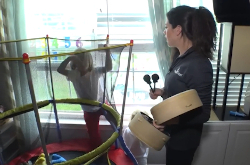음악치료

Several major studies have suggested music can be good for one’s health. The research has shown that listening to music or playing instruments can help heal both physical and mental conditions.
In the United States, there are more than 6,000 trained music therapists. Many of them work with people with special needs to help improve communication skills and social connections.
One such example is Lucas, a 3-year-old boy from Virginia who has autism. Autism, also known as Autism Spectrum Disorder, is a complex developmental disability. It affects a person’s ability to communicate and do things with other people.
Katey Hernandez is Lucas’s mother. She told VOA that her son’s condition can cause him to react strongly to loud noises or bright lights. “And he really likes to jump and swing and climb, and anything active,” she said.
Lucas is currently receiving weekly one-on-one music therapy treatments. "Hey, hey, hey, I got a question for you today." His therapist, Dixie Mazur, visits Lucas at home and brings along several musical instruments.
During the visits, Mazur plays music and sings. Her goal is to help increase Lucas’ attention span and improve his communication skills.
“I brought in piano today because I’ve found that piano can be a great tool to work with anybody -- it provides a lot of independence.”
Mazur also brought in drums, which she said can be an effective tool to engage a person or redirect their attention. She likes to work with as many different instruments as possible. This gives the individuals “the freedom and ownership” to take the therapy in any direction they want it to go, Mazur said.
Lucas’ mother says Mazur’s therapy has so far been very helpful and she is happy with the results she sees.
“Ms. Dixie has come up with a few songs to help him with social dialogue. So it helps him communicate with us a lot more, when we can’t figure out exactly what he needs.”
Zoe Gleason Volz is another music therapist. She works in a group setting with people who have different cognitive disabilities.
“A lot of my work is trying to slowly get them to positively engage with their fellow group members, as well as actively engage with me.”
Gleason Volz says scientific research has shown that when a person is listening to music, the entire brain “is lit up” with activity. “Whereas, when you’re talking with somebody, you’re probably more into one hemisphere of the brain rather than both,” she said.
Music therapist Kelsi Yingling founded the company NeuroSound Music Therapy, where Gleason Volz and Mazur work. She says that, in addition to training, music therapists also need personal qualities to help them connect with the people they work with.
These include strong musical and personal relationship skills, as well as the ability to work well with many kinds of individuals and in different situations.
Yingling says that for her, using music to help people reach their goals and improve their lives “is really one of the most rewarding things I can be doing in my life.”

